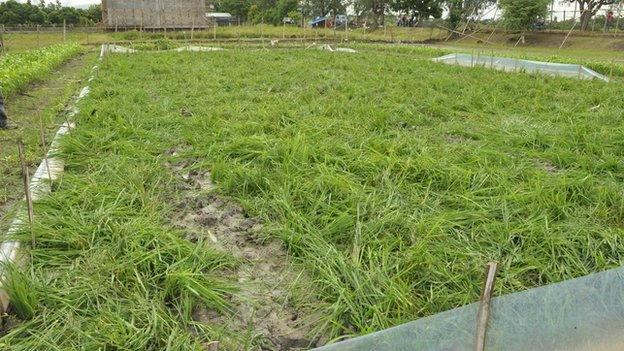'Golden rice' GM trial vandalised in the Philippines
- Published

Protestors trampled the experimental rice plants at this site in the Bicol region
A trial plot of genetically modified rice has been destroyed by local farmers in the Philippines.
"Golden Rice" has been developed by scientists to combat vitamin A deficiency, which affects millions of children in the developing world.
The crop was just weeks away from being submitted to the authorities for a safety evaluation.
But a group of around 400 protestors attacked the field trial in the Bicol region and uprooted all the GM plants.
The project to develop Golden Rice was started 20 years ago in 1993 by German researchers with funding from the Rockefeller Foundation.
The rice has been modified by adding extra genes that turn on the plant's ability to produce beta-carotene, which humans can convert into vitamin A.
A lack of this vitamin increases the chances of blindness and susceptibility to disease. Vitamin A deficiency is a significant problem among children in developing countries.
According to Helen Keller International, around 670,000 children will die each year from the problem, while 350,000 will go blind.
It is estimated that one cup of Golden Rice could provide half an adult's recommended daily intake.
Testing times
Golden Rice field trials are currently being carried out in the Philippines under the auspices of the International Rice Research Institute (IRRI), together with PhilRice, the local research body.
The issue of GM crops has proved contentious in the Philippines
Five small test plots have been planted with the idea that there would shortly be a submission to the regulatory authority of the Philippines. It was hoped that initial releases to farmers could happen in 2014.
The plot in Bicol was guarded and fenced but the protestors broke through the security and uprooted and trampled the rice plants.
The attackers who were members of a group called Sikwal-Gmo say they attacked the crop because they believe that GM technology is not the solution to malnutrition in the Philippines.
The protestors argue that international agrochemical corporations and the US are behind the drive for Golden Rice. In a statement, they said they were concerned that the rice trial was both a danger to human health and biodiversity.
The scientists involved with the trial say they were relieved that no-one was hurt during the incident.
"It was not completely unexpected as we had heard threats," the IRRI's Dr Bruce Tolentino told “óĻó“«Ć½ News.
"It was certainly disappointing to have our field trial vandalised because our Golden Rice research aims to avoid the horrible plight of women and children suffering vitamin A deficiency."
The researchers say that the development of the modified rice remains critical for the Philippines as 1.7 million children in the country aged under five are affected by vitamin A deficiency. They say they are determined to go ahead with the project.
"This is not a major setback, because it is just one trial of a series and just one of several sites. We remain completely committed to continuing our Golden Rice research to help improve people's nutrition," said Dr Tolentino.
The development of GM technology is highly contentious in the Philippines. Earlier this year, the Court of Appeals rejected another crop, an eggplant that had been modified to produce toxins to a pest. The court ruled that the crop violated the constitutional rights of Filipinos to health and a balanced ecology.
Follow Matt on .
- Published6 August 2013
- Published20 June 2013
- Published22 February 2011